
Richard Wayne Penniman, known professionally as Little Richard, was an American singer, pianist, and songwriter. He was an influential figure in popular music and culture for seven decades. Described as the "Architect of Rock and Roll", Richard's most celebrated work dates from the mid-1950s, when his charismatic showmanship and dynamic music, characterized by frenetic piano playing, pounding back beat and powerful raspy vocals, laid the foundation for rock and roll. Richard's innovative emotive vocalizations and uptempo rhythmic music played a key role in the formation of other popular music genres, including soul and funk. He influenced singers and musicians across musical genres from rock to hip hop; his music helped shape rhythm and blues for generations.

Antoine Dominique Domino Jr., known as Fats Domino, was an American singer-songwriter and pianist. One of the pioneers of rock and roll music, Domino sold more than 65 million records. Born in New Orleans to a French Creole family, Domino signed to Imperial Records in 1949. His first single "The Fat Man" is cited by some historians as the first rock and roll single and the first to sell more than 1 million copies. Domino continued to work with the song's co-writer Dave Bartholomew, contributing his distinctive rolling piano style to Lloyd Price's "Lawdy Miss Clawdy" (1952) and scoring a string of mainstream hits beginning with "Ain't That a Shame" (1955). Between 1955 and 1960, he had eleven Top 10 US pop hits. By 1955, five of his records had sold more than a million copies, being certified gold.

James Edward Burton is an American guitarist. A member of the Rock and Roll Hall of Fame since 2001, Burton has also been recognized by the Rockabilly Hall of Fame and the Musicians Hall of Fame and Museum. He was elected into the Country Music Hall of Fame in 2024. Critic Mark Deming writes that "Burton has a well-deserved reputation as one of the finest guitar pickers in either country or rock ... Burton is one of the best guitar players to ever touch a fretboard." He is ranked number 24 in Rolling Stone list of 250 greatest guitarists of all time.
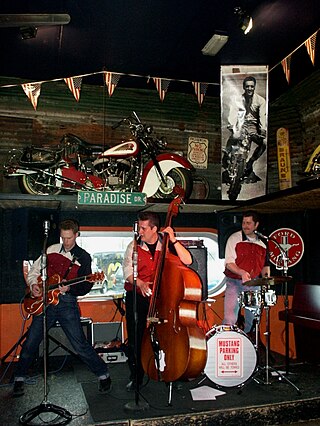
Rockabilly is one of the earliest styles of rock and roll music. It dates back to the early 1950s in the United States, especially the South. As a genre it blends the sound of Western musical styles such as country with that of rhythm and blues, leading to what is considered "classic" rock and roll. Some have also described it as a blend of bluegrass with rock and roll. The term "rockabilly" itself is a portmanteau of "rock" and "hillbilly", the latter a reference to the country music that contributed strongly to the style. Other important influences on rockabilly include western swing, boogie-woogie, jump blues, and electric blues.

What's Going On is the eleventh studio album by American soul singer Marvin Gaye. It was released on May 21, 1971, by the Motown Records subsidiary label Tamla. Recorded between 1970 and 1971 in sessions at Hitsville U.S.A., Golden World, United Sound Studios in Detroit, and at The Sound Factory in West Hollywood, California, it was Gaye's first album to credit him as producer and to credit Motown's in-house session musicians, known as the Funk Brothers.

Music of My Mind is the fourteenth studio album by American singer, songwriter, and musician Stevie Wonder. It was released on March 3, 1972, by Tamla Records, and was Wonder's first to be recorded under a new contract with Motown that allowed him full artistic control over his music. For the album, Wonder recruited electronic music pioneers Malcolm Cecil and Robert Margouleff as associate producers, employing their custom TONTO synthesizer on several tracks. The album hit No. # 21 in the Billboard LP charts, and critics found it representative of Wonder's artistic growth, and it is generally considered by modern critics to be the first album of Wonder's “classic period”.
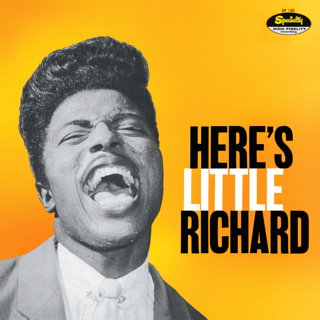
Here's Little Richard is the debut album by American musician Little Richard, released on March 4, 1957. Promoted as "six of Little Richard's hits and six brand new songs of hit calibre", the album compiles many of the A-sides and B-sides from Richard's hit singles including the Billboard top 40 entries "Tutti Frutti", "Long Tall Sally", "Slippin' and Slidin'", "Rip It Up" and "Jenny, Jenny" and the top 10 Rhythm and Blues Best-Sellers hits "Ready Teddy", "She's Got It" and "Miss Ann".

Elvis Presley is the debut studio album by American rock and roll singer Elvis Presley. It was released by RCA Victor, on March 23, 1956,. The recording sessions took place on January 10 and January 11 at the RCA Victor Studios in Nashville, Tennessee, and on January 30 and January 31 at the RCA Victor studios in New York. Additional material originated from sessions at Sun Studio in Memphis, Tennessee, on July 5, August 19 and September 10, 1954, and on July 11, 1955.

"Tutti Frutti" is a song written by Little Richard and Dorothy LaBostrie, recorded in 1955, which was his first major hit. With its energetic refrain, often transcribed as "A-wop-bop-a-loo-mop-a-lop-bam-boom!", and its hard-driving sound and wild lyrics, it became not only a model for many future Little Richard songs, but also for rock and roll itself. The song introduced several of rock music's most characteristic musical features, including its loud volume, powerful vocal style, and distinctive beat and rhythm.

Where I'm Coming From is the 13th studio album by Stevie Wonder. The album was released by Motown Records on April 9, 1971 and peaked on the Billboard Pop Albums at #62, and on the Billboard R&B Albums Chart at #7. All nine songs were written by Wonder and Motown singer-songwriter Syreeta Wright, his first wife. It was the last album produced under his first contract with Motown Records. Including live albums, this is Stevie Wonder's fifteenth album overall, and thirteenth studio album.

Robert Alexander "Bumps" Blackwell was an American bandleader, songwriter, arranger, and record producer, best known for his work overseeing the early hits of Little Richard, as well as grooming Ray Charles, Quincy Jones, Ernestine Anderson, Lloyd Price, Sam Cooke, Herb Alpert, Larry Williams, and Sly and the Family Stone at the start of their music careers.
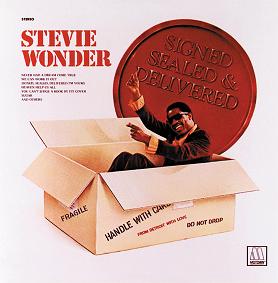
Signed, Sealed & Delivered is the 12th studio album by American recording artist Stevie Wonder, released on August 7, 1970, by Tamla Records. The album featured four hits that hit the Billboard Hot 100: "Signed, Sealed, Delivered I'm Yours" (#3), "Heaven Help Us All" (#9), "Never Had a Dream Come True" (#26) and Wonder's cover of The Beatles' "We Can Work It Out" (#13). The album hit #25 on the Billboard Pop Albums chart as well as #7 on the R&B Albums chart.
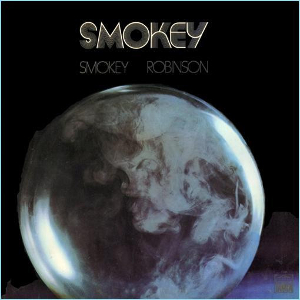
Smokey is the debut studio album by American soul singer, songwriter, and producer Smokey Robinson. It was released on June 19, 1973, by Tamla Records and was Robinson's first solo record after his departure from The Miracles. The album featured the single "Sweet Harmony", which was his tribute to his former singing partners in the Miracles: Bobby Rogers, Pete Moore and Ronnie White. Smokey was arranged by Dave Blumberg, Gene Page and Willie Hutch. It also featured the song "Baby Come Close", his first solo hit single, and the single "Just My Soul Responding", a protest song dealing with ghetto life in America, and the plight of the American Indian. Smokey peaked at number 70 on the Billboard albums chart, on which it spent 19 weeks.
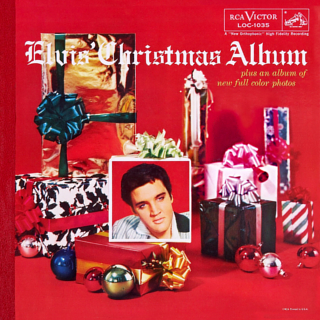
Elvis' Christmas Album is the third studio album and first Christmas album by American singer and musician Elvis Presley on RCA Victor, LOC -1035, a deluxe limited edition, released October 15, 1957, and recorded at Radio Recorders in Hollywood. It has been reissued in numerous different formats since its first release. It spent four weeks at No. 1 on the Billboard Top Pop Albums chart, and was the first of two Christmas-themed albums Presley would record, the other being Elvis Sings the Wonderful World of Christmas, released in 1971. The publication Music Vendor listed Elvis' Christmas Album on their singles charts for two weeks in December 1957 – January 1958, with a peak position of No. 49.

Hidle Brown Barnum is an American pianist, arranger, record producer, songwriter, and former child actor.
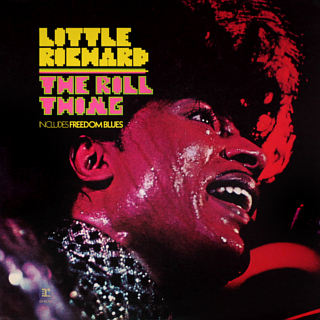
The Rill Thing is Little Richard's first album for Reprise Records, released in August 1970. It was considered a comeback album for Richard, following a three-year hiatus on new albums and an acclaimed performance at Atlantic City Pop Festival. The album utilizes a soul-influenced sound and contains Little Richard's biggest post-Specialty single in "Freedom Blues", which broke the Billboard top 50. The follow-up single, "Greenwood, Mississippi" made the top 100 and number 56 on Cashbox Black Singles. Despite the success of the singles, the album failed to chart.

The Second Coming was Little Richard's third album for Reprise Records, released in 1972. The album saw him reunited with Robert "Bumps" Blackwell from his Specialty days, with them co-writing the majority of the album together. The concept was to unite the best rock studio musicians of the '50s with the best rock studio musicians of the '70s. The album failed to chart.

Southern Child is an album by Little Richard, scheduled to be released in 1972 as his third album for Reprise Records. It was going to be Reprise RS 2097. For unconfirmed reasons the album was shelved in favour of The Second Coming, released in October. The tracks comprising the album were released in 2005 from Rhino Records as part of their Complete Reprise Recordings collection. A stand-alone version was released in December 2020.

Little Richard is the second album by American musician Little Richard, released in July 1958, ten months after Richard announced a retirement from rock and roll to pursue a life in the ministry. Like his first album, it largely contains previously released A-sides and B-sides including several which reached Billboard's Rhythm & Blues and Hot 100 charts. Nine of its twelve tracks charted in the US including Richard's fourth million-seller "Lucille", the rock and roll standard "Good Golly, Miss Molly" and "The Girl Can't Help It", the title song from the motion picture of the same name. Among the previously unreleased tracks are two Tin Pan Alley songs recorded in Richard's frantic style.

Lark is the second studio album released by British singer songwriter Linda Lewis. It was recorded at Apple studio for Reprise Records and released in 1972. It was re-released in 1973 with the hit single Rock A Doodle Do added as the first track of side 2 of the LP.


















